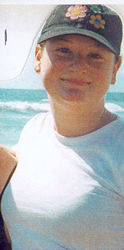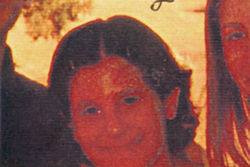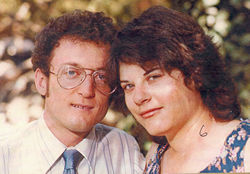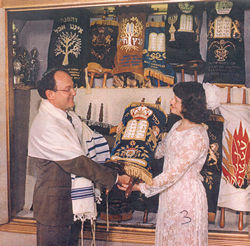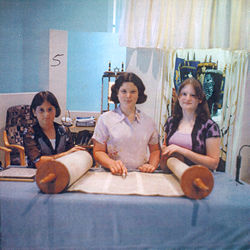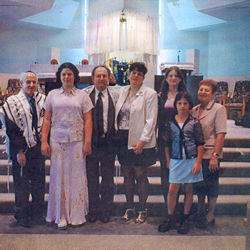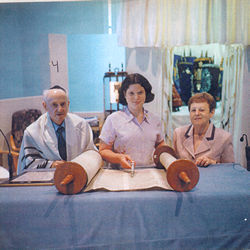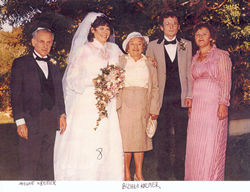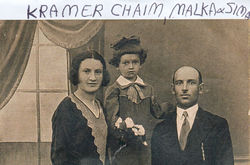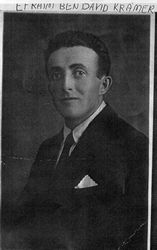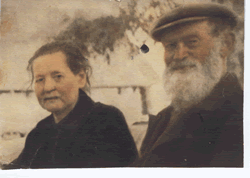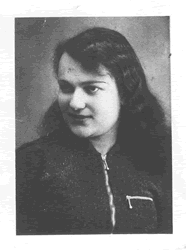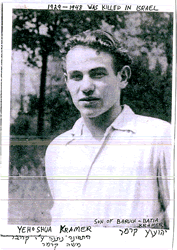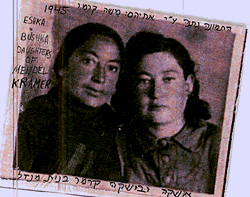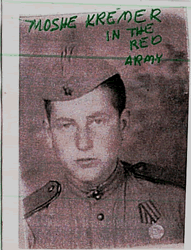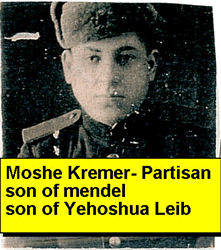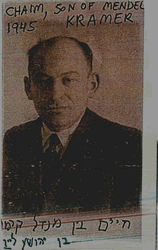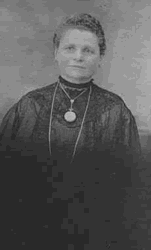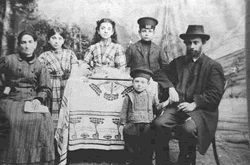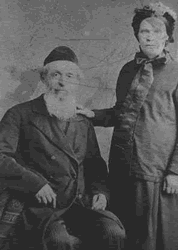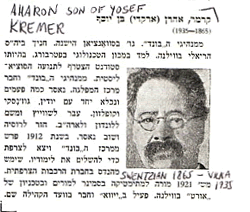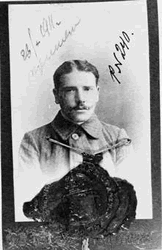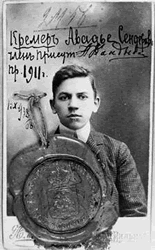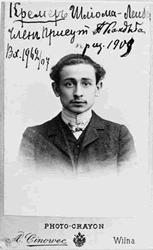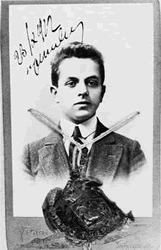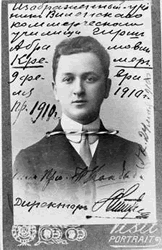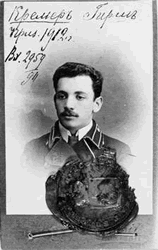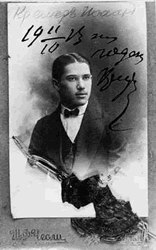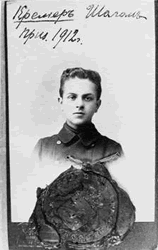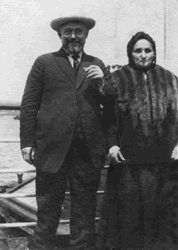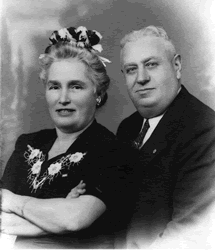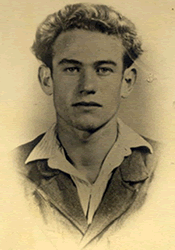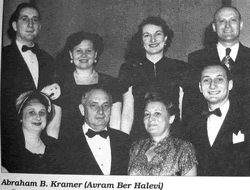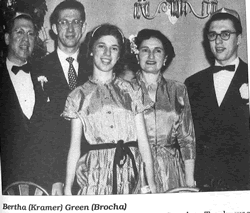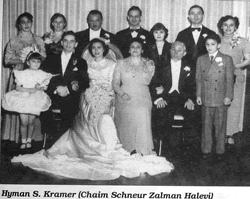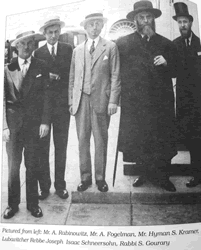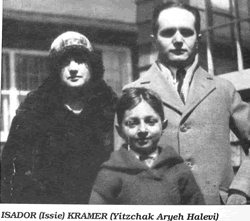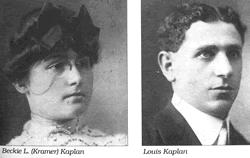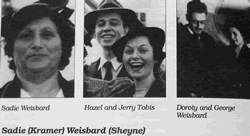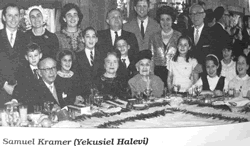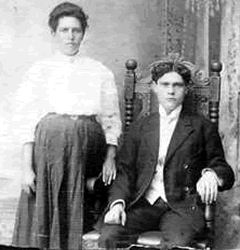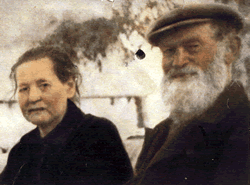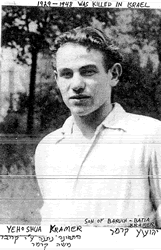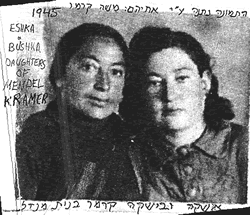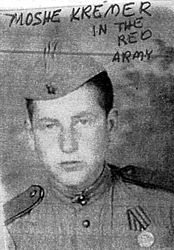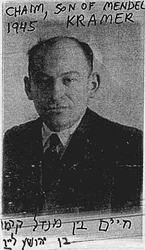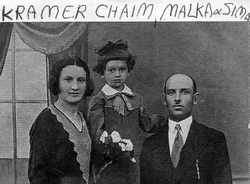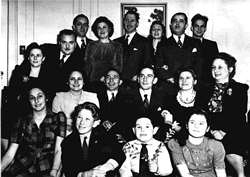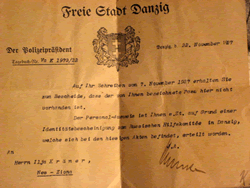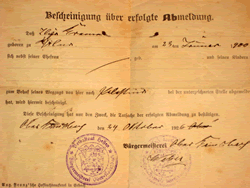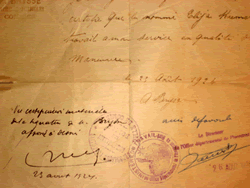#kr18:
Zlata Kremer nee Dokszycki was born in Dolhinow in 1907 to Yehuda and
Feiga. She was a housewife and married to Khaim and had a baby ( only
Chaim survived). Prior to WWII she lived in Korzeniec, Poland. During
the war she was in Korzeniec, Poland. Zlata perished in 1942 in
Korzeniec, Poland. This information is based on a Page of Testimony
submitted by her brother
AMINETZAKH (Dokszycki) YOSEF of Kfar Saba
 MORRIS STILLMAN         Rev Moshe Lazar Kramer, who was blessed to study in his youth in the Beit Midrash of Rabbi Zishka and knew him very well and was very close to him, would often say, there is a Jewish flame that is burning in me, it's all on account of Rev Zishkaâ€■Rev Moshe Lazar was born in the year 1864, and his parents at that point lived in Kurenets. After seven years, they moved to the nearby village by the name of Ostashkova. There they leased a farm and a dairy, and there they lived for the rest of their days. The Paritz, the nobleman who owned the village, when he got know Michal, the father of Moshe Lazar, as he found out his honesty and his charming personality, liked him very much and became his confidante. He appointed him as the manager of all his businesses and made him well known amongst all the other noblemen of the area. He made a very good living through numerous, varied enterprises, and endowed large funds for good deeds. Once in a while he would travel all the way to Lubavitch to the Chabad rabbi, at first it was to Rabbi Mendeleh and later Rabbi Shmulkeâ€■â€■ In all the towns in in the area, amongst them Kurenets, Ilia, and Ratzke, he was renowned for his generous gifts to Jews that had lost their money, or Jews who were needy. His wife would go every Saturday night to the little town of Ratzke and would give meat, chalahs, bread, and butter to the poor. She had the habit of raising geese every year and she used the meat to give to the poor and the feathers she gave to insolvent brides for their dowry. A guest who came to their house would always find tables laid out with splendid food and beds ready for any guests who were in need of a place to sleep.When he was still very young, Moshe Eliezer Kramer showed much talent. He had a very sharp mind and a very fresh memory, and when he arrived to the age of Bar Mitzvah, he made a beautiful sermon [drasha]. Rav Zishka was very impressed and bestowed magnificent praise for the lad before his father, and said that he must be sent to study Torah in the yeshiva in Ilia. When he finished two years of study in the yeshiva in Ilia, he returned to his home and started working on the farm. Since in his very essence he was full of energy and a true entrepreneur, no work was too difficult for him. He worked in the fields, he carried tree trunks from the forest, he took care of the livestock, and he grew up to be a strong young man who spread fear amongst the other villagers. At one time the Christian villagers tortured a Jewish traveling peddler who went through the villages with his merchandise. When Moshe Eliezer Kramer came by and saw what they did, he quickly ran to the Christian hoodlums and beat them up to teach them a lesson. He was an absolutely fearless guy, and during the darkest of night he would walk in the deep forest fearlessly. One time the villagers played a prank and when he went alone in the forest they came to him dressed in white sheets, carrying torches in their hands. And like that they surrounded him. When he saw this parade he immediately understood that it was a prank and he ran to them and started beating them up as hard as he could, and since then their admiration for him grew tenfold. When he turned 17 he wedded. His wife, Rachel Elka, was from a well-known Chasidic family from Dvinsk. She was the only daughter amongst male children who were renowned for their Torah knowledge. One of her brothers was Baruch Hadesh from Vizi. Other than his brilliance in Torah studies, he was also a well-known businessman. One time when he came to Smorgon for business, he encountered Rev Michal Kramer, and after they had a conversation he (Rev Michal) mentioned his son Moshe Lazar. He told Rev Baruch how his son was an excellent Torah learned man and also a good provider, and that he was looking for a bride from a good family. Rev Baruch told him that he had a sister at the age of matrimony, and that he was looking for a respectable groom for her. So they decided amongst themselves that he should come to Ostashkova with his sister to meet the family. First, Rev Baruch went to Kurenets to Rabbi Zishka to hear his opinion about this match, and Rav Zishka said glorious things about the boy and his father, recommending the matchâ€■After the wedding the young couple lived in the house of Michal in Ostashkova. The first years after the wedding were wonderful. The house was filled with plenty, and the family lived in harmony and friendship. They saw their daughter-in-law as a true daughter, they respected her good sense, her high taste, and the charm of her ways. Very intelligently, the city girl was busy with teaching her groom the manners of the big city and she tried to change his village boy habits. She made sure that he had regular hours for studying the Torah, and she would sit across from him, listening with pleasure to his studiesâ€■â€■ Until he he reached the age of 20, he spent his days in pleasantness, but then came a period of troubles. Since he was a strong person and healthy both in his body and mind, he had no chance of avoiding military service. In order to do it, his only choice was to leave the village and for three years live in hiding until he found a way to be released from his obligation. But as soon as he got out of one trouble, he encountered a second, even bigger problem. This was the issue of the Fravozitlestevo, meaning the permission to live in the village. At that point in time there was an order by the Czarist government that prevented all Jews from living in the village. This order did not hurt Jews who lived in the village prior to that time. They were allowed to stay there with their children until they reached the age of 20. Any children who were above the age of 20 were ordered to leave the villages immediately. So now, Moshe Eliezer with his wife and his three babies was ordered to leave Ostashkova. For a short time they lived in a village near Ilia, and they were able to do it at the mercy of the local official. Except they couldn't stay there for too long since the governor of the region found out about it and he ordered them to leave the place immediately. The Jewish family disregarded the order and stayed there, and when the governor found out, he became very angry and sent an emergency order to the head of the village to immediately kick out the Jewish family and to prevent them from taking any of their possessions other than what they wore at the moment.. This order came on the afternoon of the eve of Yom Kippur. Two strong Christian men entered Moshe Lazar's house and ordered him in the name of the law to immediately leave the village. No amount begging or pleading that this should be done after Yom Kippur could help him. He had no choice but harness the horses to the carriage and to put his wife and children there and go on their way. The entire family cried bitterly. Only he held firm and didn't cry. He started putting his belongings on his carriage as much as he could, and when the Christian men tried to prevent him from doing it as their orders had said, he told them; “ Preventing me from doing it would cause me such devastation that I would not be able to control what I would do and You would find yourselves in danger, and you would not be able to get out of here alive.â€Â?Hence they left him alone, and they even helped him load his belongings.Consequently on the eve of Yom Kippur, at a late afternoon hour, the poor family arrived at the little town of Ilia. With difficulty he found an apartment for his family and started looking for some way to earn a living. Since he had a horse and buggy, and since he was a strong man, he started all kinds of hard labor, bringing wood from the forest, rocks from the fields, and any kind of job he encountered. Despite all of it he had little earnings, and if it wasn't for his father's help, he would not have survived.He would say that those years in Ilia were the worst years of his life. In later years, when his situation greatly improved, he would talk about that time with humor. He would say that there was one good thing that he learned during that time, which was that while he was walking through the forests and the fields, he would say passages from Psalms and for that, all the chapters of the book, he could recite by heart. After years of toil and poverty, he accepted that there was no sense in continuing such a life and he decided to leave Russia and immigrate to America. At first his father was very much against this plan, but there was an incident one-day when Moshe Eliezer Kramer brought wood from the forest. His carriage drowned in the mud, and Moseh Lazar worked for many hours trying to get it out. By coincidence, his father passed by and when he saw him in his misery he started crying and immediately gave him permission to go to America.The preparations for travel were made secretly, and no others in the family knew about it. The carriage that came to take him didn't meet him at the house but waited for him outside of the town. To his family members he said that he was going for business to a nearby town for his job. Only his father came to see him of, he walked with him until they were far from the town. There they said their good-byesâ€■
â€■ After many years in America, where he became very well off andd renowned, Moshe Lazar traveled to his hometown Kurenets in the year 1920. He was 56 years old and during those days there was war between Poland and the Bolsheviks for control of the area. Truly it was many years that his soul yearned to see his hometown and to meet with his relatives, and to go pay his respects to the graves of his forefathers. But this trip, more than it was for himself, was for the sake of other people. He was a messenger of Mitzvah or charity. He had with him more than $25,000 that he planned to divide amongst hundreds of families in Kurenets and the surrounding towns that were devastated and impoverished during the days of the war. Many, many came to see him off at the ship, and he received many blessings from his friends, other Kurenets natives in America. One old man, Shmaryahu Fingerhut, couldn't contain his excitement for the moment, and he immediately made a vow to roll twice if Moshe Lazar would return peacefully from his trip. The old man did complete his vow.
Until he arrived at Warsaw he didn't encounter any difficulties, but here on it was a difficult road. He found out that the Bolsheviks were coming near Kurenets and to travel in such a situation near Vilna, especially since he had 4 million in Polish marks inside a suitcase, was very dangerous. But he didn't bother thinking about all the troubles he might encounter and he went on his way to Minsk. The town was already blockaded, and when they came they stopped him and took him to the commanding officer. He was then imprisoned and the money he had was confiscated since they suspected him of helping the Bolsheviks. But after the officer checked the letter of commendation that Moshe Kramer received from the Polish government in Warsaw that explained that the money was to be used for charity, and after examining the State Department papers from Washington, he returned the money to him and released him. Since he was very brave and he knew the language very well, he was able to get the passport to go to Kurenets and immediately went on his way.All the train cars were filled with military men and arms. Traveling on those trains was very dangerous. In spite of all this he was able to arrive at Molodetszna, which served as a train crossroads from many places. He arrived that night and was to take a second train to Vilejka. The train was filled with drunken soldiers and he was the sole civilian in the entire station. He had to wait for the next train for a few hours, and this was very dangerous. When finally the train was going in the direction of Vilejka arrived, it contained only two cars, and those were filled with soldiers who wouldn't let him go up. After much pleading the conductor let him stand near the furnace with him. When
he went up on the train one of the soldiers helped him carry one of the two heavy suitcases. He smiled and said, Oh, you must be carrying a huge amount of gold in here and ordered him to open his suitcase. Moshe Lazar who was clever and had thought of such a possibility had put the money deep inside the suitcase and covered it with clothes, and on top he put some bottles of alcohol and food. So when he opened the suitcase nonchalantly, in a very good and humorous spirit, he took out a bottle of brandy and offered it to all the soldiers. After one toast after another, all the bottles were empty. As the soldiers were filled with good spirit, they became friendly and offered him a place among them. They didn't bother him anymore.In Vilejka he got off the train and walked from the station to the town, about 2 km away, holding the suitcases. When he arrived he went to a hotel and invited all the heads of the town. He divided about four or five thousand dollars among the residents and saw him as a sort of savior angel. The way from Vilejka to Kurenets he did in a carriage that was filled with soldiers. He paid them one hundred dollars to guard him. When he entered Kurenets he immediately realized the destitution. The houses were broken and falling down. The windows were covered with rugs. Many of the doors were locked and the streets were empty of all people. In a short time the town had passed hands nine times from the Russians to the Germans to the Polish. This occurred on Sabbath night, on the P of Balakh. As soon as he arrived in town he visited the grave of his parents. The town stood exactly at the front. The Polish retreated and the Bolsheviks came close. The Rabbi of the town begged that he should not stay here since it was so dangerous, and that he must leave the town with the retreating Polish army, which would respect the fact that he was an American citizen. But he was adamant about staying and all the begging was to no avail. The first reason, he said, it is the eve of Sabbath and there was no such danger that would make me disrespect the Sabbath. He continuedâ€■Second, why is my life more dear than the other residents of the town? Maybe it was an order from Heaven that I should die in Kurenets to be buried next to my forefathers. The next day the Bolsheviks came to town. It took six to seven days for the parade of conquerors to pass through. The soldiers of the Red Army were very poor and didn't have any uniforms. Their clothes were tattered. In the first two weeks they behaved themselves and didn't hurt anyone, but on the third week they started some troubles. At first they took all the food from the residents and only left amount sufficient for one week. After that they printed their own money and they disallowed any of the Czarist or Polish money. But the farmers in the area refused to sell any food for the new money, and the situation became more and more severe. He stayed in the town more than one month without being able to leave. Hard days came for him as well as for the rest of the residents, and he knew a period of starvation. The bread at that point was made from a little bit of flour mixed with hay, and as much as the residents of the town tried to help him, they could not. Sometimes they would share potatoes that they had found in the field. In spite of all of this his spirits were always good and every morning he would get up to say a psalm. And his voice would awake others and make them get up for prayer. For many days he sat in the synagogue, studying and telling stories to people. Between Mincha and Maariv, he would read before the congregation from the Midrash and Eyn Yaakov. During those days it fell on the fast of the ninth of the month of Av, and later on he used to say he never cried as much as he did on that day.
The month of Tishrei was nearing and he really wished to spend Rosh Hashanah with his family in the US so he started taking care of arrangements to leave. After much trouble he received from the commissar permission to go from Kurenets to Vilna, but all the people who owned horses and carriages feared to go such a dangerous route, endangering their horses and carriages. This left him no choice but to buy a horse and carriage of his own, and he paid a large amount of money for them. That person he bought it from endangered his soul and traveled with him to Vilna. The entire town gathered to follow him on the way out of town and they blessed him with love and wishes of peace. When he arrived at Vilna he gave the genius Rabbi Chaim Ozer $12,000 for Kurenets, designated to establish a small yeshiva of Talmud Torah, Bikur Cholim, and a bank. For the Jews of Kurenets his visit was an extraordinary event and for many days it was the main topic of conversation in Kurenets as well as in the neighboring towns.
& grand father Louis Kaplan.
Morris Eliezer Kramer is also known as Moshe Leizer.
Researching: STILLMAN (originally from Jurburg)
KRAMER (originally from Kurenitz)
MOHL ( " " Lancut and then Dusseldorf)
DAVIDSON ( " " Lemberg and then Zurich)
*********************************************************
MORRIS STILLMAN
#kr33:
Yehoshua Kremer ( 1928- 1948) Survived the holocaust in the forest hiding with his baby sister. Both came to Israel after the war. Yehushua was killed fighting for Israel.
Written on back in English) "Kamai and Rakischky."
City Rokiskis Turn of the century
#kr43:
Mendel And Chana
Mendel Kremer was born in Kurzeniec in 1885 to Yehoshua and Eshia. He was a merchant and married to Chana (Chana Kremer was born in Kurzeniec in 1890 to Pinkhas Ayeshiski). Prior to WWII he lived in Kurzeniec, Poland. During the war he was in Kurzeniec, Poland. Mendel perished in 1942 in Kurzeniec, Poland at the age of 57. This information is based on a Page of Testimony submitted by his son
Other reports by Moshe: his brother Gershon Kremer was born in Kurzeniec in 1914 to Mendel and Chana. He was a merchant and single. Prior to WWII he lived in Kurzeniec, Poland. During the war he was in Kurzeniec, Poland. Gershon perished in 1942 in Kurzeniec.
his brother Kremer Yehoshua
Yehoshua Kremer was born in Kurzeniec in 1924 to Mendel and Chana. He was a student and single.
his brother; Kremer Yakow
Yakow Kremer was born in Kurzeniec in 1910 to Mendel and Chana. He was a merchant and married to Henia. Prior to WWII he lived in Kurzeniec, Poland. During the war he was in Swir, Poland
His brother Baruch was the son of the first wife of Mendel: Sheina nee Alperovitz. He was born in 1905. He married Batia nee Zeidman who was born in Molodeczno in 1910
They had 2 children: daughter Miryam survived and lives in Israel. Son Yahoshua also survived was a soldier and killed in the war in Israel.
#kr44:
his brother in law; Shkolnik Meir
Meir Shkolnik was born in Kurzeniec in 1903. He was a merchant and married to Busya. Prior to WWII he lived in Kurzeniec, Poland. During the war he was in Myadel, Poland. Meir perished in 1941 in Myadel, Poland at the age of 38. This information is based on a Page of Testimony (displayed on left) submitted by his brother-in-law
Survoved: Ashka and Bushka from first wife of Mendel
#kr45:
another Kramer family from Kurenets:
Kremer Khaim
Khaim Kremer was born in Kurnic to Dvora. He was an accountant and married to Malka nee Gurfinkel and had 2 children. Prior to WWII he lived in Kurnic, Poland. During the war he was in Kurnic, Poland. Khaim perished in 1943 in Kurnic, Poland at the age of 50 ( the ages must be wrong). This information is based on a Page of Testimony (displayed on left) submitted on 26-Jul-1999 by his brother-in-law Yizhak Gurfinkel of Kibbutz Ein Shemer
Kremer Malka
Malka Kremer was born in Kurenets in 1888 ( was born much later c 1904) to Beniamin and Feiga Gurfinkel. She was married to Chaim. Prior to WWII she lived in Kurenets, Poland. During the war she was in Kurenets, Poland. Malka perished in 1943 in Kurenets, Poland at the age of 55. This information is based on a Page of Testimony (displayed on left) submitted on 26-Jul-1999 by her brother Yizhak Gurfinkel.
Yaakov Sade of Ness Ziona, The son Of Khaim Kremer' sister ( Leah Sade, see her reports), also gave reports
Kremer Khaim
Khaim Kremer was born in Kurzeniec in 1908 to Yaakov and Dvora. He was a bank clerk and married to Malka. Prior to WWII he lived in Kurzeniec, Poland. Khaim perished in 1941 in the Shoah at the age of 34. This information is based on a Page of Testimony (displayed on left) submitted on 30-Apr-1999 by his nephew Yaakov Sade of Ness Ziona
Kremer Dvora
Dvora Kremer was born in Wilejka. She was a grocery owner. Prior to WWII she lived in Kornitz, Poland. Dvora perished in 1942 in Kornitz, Poland at the age of 48. This information is based on a Page of Testimony (displayed on left) submitted on 30-Apr-1999 by her grandson Yaakov Sade of Ness Ziona
Malka Kremer was born in the Wilejka area in 1910. Prior to WWII she lived in Kornitz, Poland. Malka perished in 1942 in Kornitz, Poland at the age of 32. This information is based on a Page of Testimony (displayed on left) submitted on 30-Apr-1999 by her relative
Yaakov Sade of Ness Ziona
Kremer Sima
Sima Kremer was born in Kurnic in 1932 to Khaim and Malka. Prior to WWII she lived in Kurnic, Poland. Sima perished in 1941 in the Shoah at the age of 10. This information is based on a Page of Testimony (displayed on left) submitted on 30-Apr-1999 by her cousin Yaakov Sade of Ness Ziona
#kr46:
Moshe Kramer (pictured here during the war)lives in Petach Tikva, Israel he has a son Menachem who lives in the states with his 3 daughters. other children of Moshe live in Israel.
Moshe' brother: Chaim came to America after the Shoah. He lost his first wife and baby girl in the shoah. Here are the information for first wife: Kremer Zlata
Zlata Kremer nee Dokszycki was born in Dolhinow in 1907 to Yehuda and Feiga. She was a housewife and married to Khaim and had a baby girl. Prior to WWII she lived in Korzeniec, Poland. During the war she was in Korzeniec, Poland. Zlata perished in 1942 in Korzeniec, Poland. This information is based on a Page of Testimony (displayed on left) submitted by her brother Yosef Aminezach ( nee Dokszycki) of Kfar Saba
#kr47:
Moshe reported his fathers information to Yad Vashem: Kremer Mendel
#kr48:
Leah Sade ( nee Kramer ) of Yafo reported;
Kramer Malka
Malka Kramer nee Gurfinkel was born in Kurenets in 1904 to Beniamin and Sima. She was a housewife and married to Khaim and had a daughter Sima born in 1927. During the war she was in Kurenets, Poland. Malka perished in 1942 in Kurenets, Poland at the age of 20. This information is based on a Page of Testimony (displayed on left) submitted on 16-Feb-1956 by her sister-in-law. ...
Kramer Haim
Haim Kramer was born in Kurenets in 1902 to Yaakov and Dvora. He was a clerk and married to Malka nee Gurfinkel. Prior to WWII he lived in Kurenets, Poland. During the war he was in Kurenets, Poland. Haim perished in the Shoah at the age of 22. This information is based on a Page of Testimony (displayed on left) submitted on 16-Feb-1956 by his sister
Kramer Dwora
Dwora Kramer nee Alperovitz was born in Kurenets in 1875 to Levi and Lea. She was a merchant and married to Yaakov. Prior to WWII she lived in Kurenets, Poland. During the war she was in Kurenets, Poland. Dwora perished in 1942 in Kurenets, Poland at the age of 25. This information is based on a Page of Testimony (displayed on left) submitted on 16-Feb-1956 by her daughter.
Name: Yechiel Michael KRAMER
Given Name: Yechiel Michael
Surname: Kramer
Sex: M
Birth: cir 1840
Death: 1914
Marriage Itke UNKNOWN b: in Dvinsk Children;
1. Morris L. KRAMER b: 1864 in Kurenitz, Death: 30 Apr 1925 in Brooklyn, N.Y. +
Rachel Elka Stikan (RIVKIN) b: cir Ca 1862 in Dennenburg Married: 1880
Children
------------------- Beckie KRAMER b: cir 1881
--------------------- Hyman S. KRAMER b: 30 Dec 1882 in Ilya,-- -
----------------------- Unknown KRAMER b: in Brooklyn, N.Y.
-------------------- Sadie K. KRAMER b: 15 Dec 1887
--------------------- Abraham B. KRAMER b: 19 Jun 1888
----------------------- Isidore H. KRAMER b: 28 Feb 1890
-------------------- Samuel KRAMER b: 10 Nov 1894 in Kurenitz,
-------------------- Bertha KRAMER b: 16 Oct 1900 in Brooklyn, N.Y.
2. Yishei Wolf KRAMER
3. David KRAMER
4. Bas Sheva KRAMER + Baruch Mordechai ZEIDENKNOPF Children;
------------- Fannie D. ZEIDENKNOPF b: 15 Aug 1898 in Vilna Geberna, Russia
------------------ Bashe ZEIDENKNOPF
---------------- Rashe ZEIDENKNOPF
-------------------- Avraham Moshe ZEIDENKNOPF
----------------- Peretz ZEIDENKNOPF b: cir 1912 in Kurenitz
5. Yekutiel KRAMER + Nechama UNKNOWN Children;
--------------- Yechiel KRAMER b: cir Ca 1900 in Kurenitz, +Marriage 1 Zisla (KRAMER?) b: 15 May 1911 in Glubokee, Children
Living KRAMER
Living KRAMER
------------------- Abraham KRAMER
------------------ David KRAMER
------------------- Chaim Zalman KRAMER
---------------- Ruchama KRAMER
------------------ Shiye KRAMER
6. Chaya Yeshka KRAMER Death: 20 Jul 1932 Marriage Abraham ALPERT Children;
-----------------Sarah Goldah ALPERT
-------------------------- Moshe ALPERT
-------------------Sadie ALPERT
----------------------Unknown UNKNOWN
------------------------Pauline ALPERT
Kurenets, Belarus (Yizkor book Pages 20-26) http://www.jewishgen.org/Yizkor/kurenets/kur020.html
.....At that time (early 1000s), a person who became important in our town was Yekutiel Meir Hakoen Kremer. He was very God fearing and honest in his ways, and he would teach Mishna to the community of the old shtiebel. His father was Reb Yehoshuah Leib Hakoen Kremer the Melamed. Reb Y. Leib was very knowledgeable in all the Mishna and many times would repeat the Mishna by heart. All his sons were honest and God fearing people. Besides Yekutial Meir there was Nachman Yosef Kremer, Mendel Kremer, and Chaim Zalman Kremer. All of them were businessmen, and Yekutiel Meir was also a merchant. He had a flour store but he was still busy learning Torah. Whenever you passed by his store you could see that there was a book in his hand. He was the son-in-law of Reb Yehiel Yentes and lived in his house. His brothers-in-law were the son of Yakov Mendel Markon, the owner of the flourmill in the village Ivontsevich, near Kurenets. Another brother-in-law was Zishka, son of Shimon Alperovich. Everyone in Kurenets respected the family.
Kurenets, Belarus (Pages 20-26)
Hundreds of pictures of Kurenets on ; Welcome to the Kurenets Site
http://www.eilatgordinlevitan.com/kurenets/kurenets.html
I
Mendel Kramer son of Reb Yehoshuah Leib Hakoen Kremer children;
Ashka
Bushka
Chaim
Henia
Moshe
Baruch (his son Yehoshua 1929- 1948, sister survived and lives in Israel )
Chana married Mendel Kremer. they both perished on 9-9-1942 in Kurenets, there picture; http://eilatgordinlevitan.com/kurenets/k_pix/kurenets_portraits/31701_14_b.gif they had four children.who survived the war; Moshe Kremer (who I talked with in Israel) born in Kurenets 1928 was a partisan and in the Red Army. picture; http://eilatgordinlevitan.com/kurenets/k_pix/partisans/123101_2_b.gif
Ashke survived the war and came to U.S picture with half sister Bushke;
http://eilatgordinlevitan.com/kurenets/k_pix/kremer/120801_2_b.gif
brother of Eisheski married the grandaughter of Yehoshua Leib Kremer. the entire family prished
Name: Yekutiel KRAMER son of
Reb Yehoshuah Leib Hakoen Kremer the Melamed.
same as;
Given Name: Yekutiel
Surname: Kramer
Sex: M
BARM: Kurenitz, (Vilna) Poland Father: Yechiel Michael KRAMER b: cir 1840
Mother: Itke UNKNOWN b: in Dvinsk
Marriage 1 Nechama UNKNOWNChildren
Yechiel KRAMER b: cir Ca 1900 in Kurenitz, (Vilna) Poland
Abraham KRAMER
David KRAMER
Chaim Zalman KRAMER
Ruchama KRAMER
Shiye KRAMER
from Ancestry World Tree Project: Kramer Family Oct. 2003
Given Name: Yehoshua Leib
Children from my information;
1. Yekutiel Meir Hakoen Kremer. married Sarah Rifka, the daughter Reb Yechiel Yentes
Yehiel and wife Zisla died while hiding in the forest
David
Chaim Zalman his wife and child killed on 9-9- 1942 in Kurenitz2. Mendel Kramer married Eishesky Chana they both perished on 9-9-1942 in Kurenets
children;
Yishayu,
Ashka, Bushka, Chaim. Henia, Moshe,
Gershon,
Baruch? (his son Yehoshua 1929- 1948, sister survived and lives in Israel )
3. Nachman Yosef Kremer
4. Chaim Zalman Kremer.
Moshe Kremer told me about his cousins from the ISAACSONÂ family;
5.. Dobe KRAMER + Moshe Eliezer ISAACSON Children;
Shmuel ISAACSON b: 1903 in Radoshkovitch, Russia
Channah CHVOINIK b: 1911 in Roznoi
Married: 1933 Children;
Living ISAACSON
Living ISAACSON
Miriam ISAACSON b: 1905
Marriage 1 Michael (Grubber) GILBOAChildren
Moshe GILBOA b: 1929 in Poland
Living GILBOA
Channah ISAACSON b: cir Ca 1910 Marriage 1 Shmuel FOHRER Children
Living ISAACSON
Izhar ISAACSON b: 1939
from the Yizkor book for Kurenitz;
....The old Shteible was built with red bricks. Near the door in the Western Wall, there was a big sink to wash your hands. On the walls, there were shelves full of books. The people who would pray here were Laibe Masha's, Ykutiel Meir Kremer, Yisrael Micheal the Shochet, my father Eliyahu Alperovitz the Lemonade maker. They were also Lubavitch Hassid's and they would sit studying from early in the morning until late at night too. They would read the bible, they would say Tehilim and converse about social matters.
......From the other area, where the women sat, came down voices and cries that would quickly spread throughout the entire synagogue. I would recognize the voice of Sarah Rifka, the wife of Yekutiel Meir Ha-Cohen Kramer, and truthfully Sarah Rifka had a good reason to cry: not only did they have difficulties in eking a living, but in their house grew up a blind child (David) that the physicians had not been able to cure. Everyone's heart would cry when we would watch how they helped him walk to the synagogue. “ Mi bekitzor, mi lobektizor?� (Who is at the end of his days? And who is not at the end of his days?) cried Israel Itzha, and the entire congregation would join in crying with him. After this prayer I would watch my father and would see that although he was usually not among the sentimental people, he would also weep, and surreptitiously wipe his eyes with a kerchief......
Old Images
We would gather in the house of Yekutiel Meir Kremer. They had a son who was blind ever since he was four or five. His name was David. Many of us remember David, who was very involved with people. He would sit in the barn and touch the different things like the wheat, the flour, etc. All he had to do was touch a little bit and he could tell what type of flour it was, what it had been made from, and even what color of flour it was. Sometimes it seems as if he knew people by the way they walked or the way they breathed. His younger brother Chaim Zalman Kremer, would sit by him and read the paper to him. David who had the most wonderful memory, would observe every bit of information. He was like a hole in the ground that would not lose one drop. Everything that was read to him, from important essays on the news to the daily unimportant information, all was kept in his head as if they were papers in boxes. In the house of Yekutiel Meir, people would gather for Zionist meetings because the young sons were very involved. In all the rooms of the house there was the constant smell of fresh bread that was being baked. One day, when I came to the house, David told me, “Yehoshua I want to ask you something.� His eyes were looking straight up. I answered, “For you I will do anything you wish.� I must say that everyone loved David and everyone wanted the best for him. We would measure the advancement of medicine by the ability to be able to give David his sight back. Many times we would imagine the image of David going to a large city with famous doctors and here he sits at the doctor's clinic, being taken care of, and when he comes out, all of a sudden he is able to see. We kept talking about the big cities in the world, but who would give him his sight back in Kurenets? Sherkvas the goy? Sherkvas the goy who is a doctor's assistant who has a huge stomach and was always conversing with the devil and the spirits? One day, David was taken to the big city to see some famous doctors, and we were very disappointed with science when they could not find any treatment for him. So obviously now I was ready to listen to his request. “I want you to teach me the mandolin,� he said. When I heard him say that, I was surprised at myself, that this idea never came to me before. I knew that usually blind people had a good ear for music. “I will be happy,� I said to him, “I think you will be very good at it.� At that point I found out that this idea had come to him a long time before. His brother Yehiel bought a mandolin for David in Vilna, and brought it back to Kurenets. So David went and brought a case and opened it, bringing out a shiny new instrument. He held it almost fearfully, and his fingers patted the silk of the instrument. I took it in my hand and played a few chords and passages, and David stood across from me with his eyes open and his face, which had a little golden beard, appeared as if he was a holy image. He was about 24 at that point. On his face he had a kind smile, as if he was smiling to the tunes, and I started worrying. What if I couldn't fulfill his request? What if we find that he is not talented with music? It would be such a bitter disappointment I would take part in. For a minute I was quiet and as if he had read my thoughts, he encouraged me. “Don't be worried, Yehoshua. You will see that I will work very hard on this task and you will have no troubles from me.� I started teaching him and after a short time he was able to play perfectly. And now when you pass by their house you can hear wonderful sounds from there and you knew that these are the sounds that David lives in. You knew very well that this was not a matter of fashion, as it was for others. IT was the essence of his life. One of the most beloved tunes of David was The Tears of Israel. It's as if he lived this music in every part of his being's essence, and playing it was as if he was praying. At one time I brought a guitar and joined his mandolin playing, and his happiness could hardly be described. Always he would get a little crowd of children who came to see the miracle of how a blind person could play, and they became also very happy. Everyone, it seems, was a part of his tragedy. Old and the youth. Even the most wild kids would stand there and listen to him in holy quietness.
Kurenets, Belarus (Pages 95-98)
During those Days From the Memorial Book to Moshe Eliezer Kramer
Kurenets, Belarus (Pages 38-40) Translated by Eilat Gordin LevitanThe remote shtetl of Kurenets during the 1860s achieved a significant position in the spiritual life of its neighboring communities. It was well known for its brilliant Jewish scholars and respectable Jews and was recognized as a central headquarters for the Lubavitch Chassids in the Vilna region.
Kurenets, Belarus (Pages 244-253)
My father decided to join Leib Matosov, but just at that point, a horrible thing occurred. Ziskind Alparovich, the son of Shimon, with his wife Bashka Hannah, and her son Yikheil, Fabish Shulman with his wife and son Hannan, Berka Hadash, and Joshua Kremer (Should say Yehoshua Kramer)
Nachum Alperovich
So here we met Kopel Spektor, Nyomka Shulman, Yitzkale Einbender, Zalman Gurevitch, the brothers Motik and Elik Alperovich, Yechiel Kremer, Shimon Zirolnik, and I.....
.....One day a German officer caught me and Yechiel Kremer, the son of Yekutiel Meir who was much older then me, and we were ordered to wash the car of one of the officer. He told us "if I find out that you didn't clean it well or sabotaged it, I'll kill you like dogs." This was on Dolhinov Street not far from meat market. He ordered me to take the wheels off and clean them, at first it was hard. To take them of, but eventually we did it.
Kurenets, Belarus (Pages 156-179)
I went to the Judenrat in the house of Yechiel Kremer, the son of Yekutiel Meir, and I registered. The crowding in the house was unbearable. Everyone was looking to be saved. They all came to register as professionals. Merchants, shopkeepers and teachers, became carpenters, glassmakers and any other handy profession
Kramer J R New York City Â
Kramer Julius Brooklyn Â
Kramer Louis Brooklyn Â
Kramer Martin Brooklyn Â
Kramer Meyer New York City
Chevra Khal Chasidim Anshei Kurenitz in New York http://www.jewishgen.org/belarus/ckcak.htm
Menachem – Mendel Kramer – perished
with the thirty-two, the Jewish month of Adar, 1942. His wife, Chana and
their son Yishayu – perished while hiding in the woods.
Their daughter Henya and their sons, Moshke (Moshe did not perish- he
joined the partisans and later the Red Army and when he arrived years
later to Israel all were in shock. His son lives in California) , and
Gershon – perished the day of the slaughter, 9-9-1942.
Their children; Ashka, Bushka and chaim (his wife and child perished-
he later had a son in California) survived and after the war came to the
U.S
Baruch Kramer – perished with the thirteen, the Jewish
month of Shvat, 1942. His
wife – perished in Molodechno in another place it is
written that she perished in the forest. Their son Yehoshua survived in
the forest but was killed in 1948 during the war for Israel independence.
His young sister survived and now lives in IsraelKramer Yishayahu Zeev,
his wife; Hinda their daughter; Rivka were killed on 9- 9- 1942 Kurenitz
Yakov Kramer and his family
– perished in the shtetl Svyer.
Kramer Chaim , Malka and Sima perished in Kurenitz; I found their picture
in my grandparents album in Israel. ;http://www.eilatgordinlevitan.com/kurenets/k_pix/kremer/kr10_big.jpg
Efraim Ben David Kremer came to Israel from Kureneitz c 1920s. His picture
was also in the Album
http://www.eilatgordinlevitan.com/kurenets/k_pix/kremer/krem103_1_big.jpg
from Ellis Island;
Kramer,Chaskel Koronetz 1903 23
57 Kramer,Gittel Koronetz 1903 18
Kremerov OS: see Kramar.
Kremerovskij OS: see Kramar.
Kremichutskij (Balta) T: see Kremenchutskij. T: see Kremenchugskij.
Kremin (Bielsk, Ekater. gub.) A: see Kremen'.
Kremin' (Berdichev) A: see Kremen' [Ukrainian].
Kreminitser (Rovno) T: see Kremenetser.
Kreminshtejn (Novograd) A: see Kremenshtejn.
Kremirov (Gomel') OS: see Kramar.
Kremmer O: see Kramar.
Kremnetskij (Odessa) T: see Kremenetser.
Kremortat (Odessa) A: from `kremortartar' [Russian] tartar(?) {Krymotat}.
Kremyanskij (Poltava gub., Ekater. gub.) T: from the village Kremyanka (Cherikov d.).
Kramar (Bia€ystok, Kishinev, Tarashcha) O: kramarz [Polish], kramar' [Ukrainian] shopkeeper, storekeeper {Kramor, Kramarenko, Kramarev, Kramarov (Kramerov), Kramarovskij, Kramarskij; Kramer (Krammer), Kramerov; Kram, Kramov, Kramskij, Kramskoj, Kraminskij; Kramnik, Kramnikov, Kramnitskij; Kramko, Kramkov; Kremer (Kremmer), Kremerman, Kremerov (Kremirov), Kremerovskij; Krejmer (Krejmar, Grejmer), Krejmerman; Krom, Kroman, Kromskij; Krum, Kruman}.
From: Yitzchok Shteierman
Hello Eilat.
I came across a riveting profile on the Lubavitcher Kramers. I believe they were in Boro Park. There is a tremendous entry on them in "The history of the Jews of Brooklyn"
Rev Moshe Lazar Kramer was born in Kurenitz in 1864. Together with his sons he established the first Chabad synagogues in America. An account by the sixth Lubavitcher Rebbe, Rabbi Yosef Yitzchak Schneerson, of his arrest and imprisonment by the GPU (Soviet Secret Police) in 1927..... ....Mr. Yekusiel (Sam) Kramer (born in Kurenitz in 1894) , a prominent attorney, went to Washington. U.S. Senators William Borah (R-Idaho), Royal Coperland (D-NY) and Robert Wagner (D-NY), and Congressman Jacobstein were also involved with the efforts. Senator Borah was the Chairman of the Foreign Relations Committee the senators were on The Peace Committee and were prominent in the Soviets eyes. The U.S. State Department was also heavily involved. Most of the Chassidim in the U.S. did not believe the rumors, as they heard of it only from the newspapers, and did not rely upon that information....Considering the historical backdrop of the time, when the entire world was certain of imminent war with Russia, the international efforts to free the Rebbe are all the more impressive, as relations between the U.S.S.R. and the rest of the world were extremely strained.That first week President Kalinin and Premier Rykov received thousands of telegrams.
Picture of Hyman S. Kramer (brother of Yekusiel Sam) with the Lubawicher Rebbe; Joseph Isaac Schneersohn at the steps of the white house (during his first visit to America)
